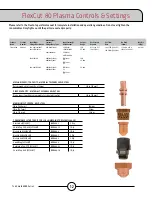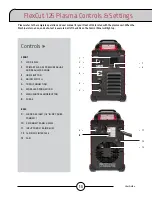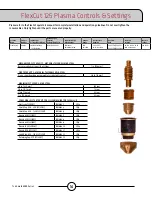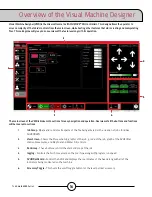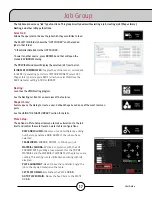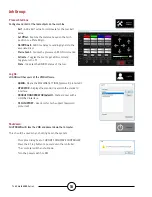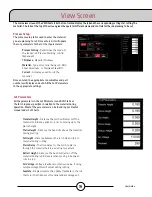
Torchmate 4000 Series
4
For more information on electromagnetic interference please visit:
http://torchmate.com/white-papers/EMI-Reduction
HOT MATERIAL:
•
Plasma cutting uses an electric arc that can reach temperatures of 45,000°F (25,ooo°C). Oxygen-fuel cut-
ting flames can reach up to 6330°F (3500°C). Any parts and scrap will be hot after cutting.
•
Use proper tools and wear heat-sheilded protective gloves in good condition when handling recently cut
material.
•
Allow proper cooling time prior to parts being handled.
ELECTRIC AND MAGNETIC FIELDS may be dangerous:
•
Electric current flowing through any conductor causes localized Electric and Magnetic Fields (EMFs). Cut-
ting or gouging current creates EMFs around torch cables and cutting machines.
•
EMFs may interfere with some pacemakers and other medical implant devices, so operators who have a
pacemaker should consult their physician before cutting or gouging.
•
All operators should use the following procedures in order to minimize exposure to EMF fields from the
cutting or gouging circuit:
•
Route the torch and work cables together and secure them with tape whenever possible.
•
Never coil the torch cable around your body.
•
Do not place your body between the torch and work cables. If the torch cable is on your right side,
the work cable should also be on your right side.
•
Connect the work cable to the workpiece as close as possible to the area being cut or gouged.
•
Do not work next to cutting power source.
ARC RAYS CAN BURN:
•
Plasma Arc Rays can injure your eyes and burn your skin. The plasma arc process produces very bright
ultraviolet and infrared rays, which will damage your eyes and burn your skin if you are not properly
protected.
•
Use safety glasses and a shield with the proper filter and cover plates to protect your eyes from sparks
and the rays of the arc when performing or observing plasma arc cutting or gouging. Glasses, head-shield,
and filter lens should conform to ANSI Z87. I standards.
•
Use suitable clothing including gloves made from durable, flame-resistant material to protect your skin
and that of your helpers from the arc rays.
•
Protect other nearby personnel with suitable non-flammable screening and/or warn them not to watch
the arc nor expose themselves to the arc rays or to hot spatter or metal.
PLASMA ARC can cause serious injury or death:
•
Keep your body away from the nozzle and plasma arc.
•
Operate the pilot arc with caution. The pilot arc is capable of burning the operator, others, or even
piercing safety clothing.
Arc Current
Minimum
Shade No.
Suggested
Shade No.
Less than 20A
4
4
20A-40A
5
5
40A-60A
6
6
60A-300A
8
9
300A-400A
9
12
400A-800A
10
14

















